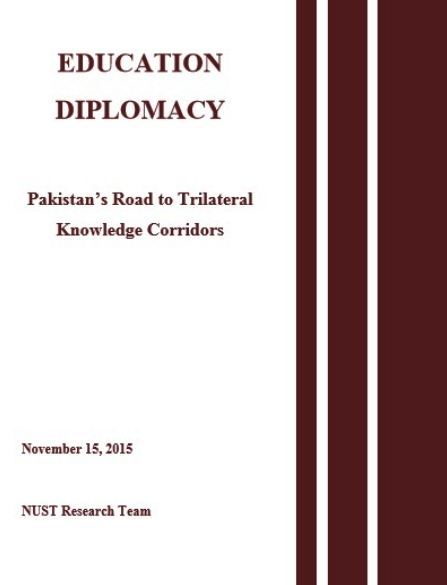The purpose of this paper is to submit implementable policy options to Standing Committee of the National Assembly on Foreign Affairs. The paper highlights areas where Pakistan requires assistance to improve its education system by tackling existing issues in Pakistan’s primary, secondary and higher education levels.
Issues include: the outdated data of education sector, poor quality of teachers, lack of training, literacy rates and dropout rates. USA and China are Pakistan’s most important strategic partners and hold a mutual interest in expanding education prospects, globally. Pakistan not only has national educational needs, but also requires international linkages to increase prospects of information and student exchange. The paper recommends a possible knowledge corridor to be initiated between Pakistan and China and Pakistan and USA, in order to propel the educational sector to newer heights and to strengthen ties with its partners by employing education diplomacy tracks. The paper mentions existing projects that have been initiated where Pakistan has already been cooperating with USA and China in the education sector. Based on these past instances of collaborations, we aim to provide recommendations on how USA and China can further provide assistance in the education sector. The areas of collaboration will be built on the assumption and precondition of the doubling of the education sector budget in Pakistan. Once that is achieved, collaborative projects in areas of primary, secondary and higher education are proposed. The recommendations also include development of the technical and vocational pool, enhancement of areas of research and language learning opportunities.
Introduction:
In the modern, globalized world there is very little space for countries to completely disengage from each other based on conflicts of hegemony. This is why both USA and China have started to approach each other with mutual understanding of common goals. The areas where the ideologies of these respective countries converge are broad and essentially relate to nontraditional security challenges such as education, environment, trade, disaster management, pandemics. The United States of America and China are Pakistan’s vital strategic partners. In order to maintain critical balance between the relationships Pakistan constructs with both powerful countries, it should focus on the points of convergence.
Since one of the areas where China and USA’s interests merge is the promotion of education around the globe, especially in the developing countries, this paper aims to highlight how the foundations of greater relations can be laid on the path of knowledge exchange. For centuries, people to people interactions and student exchanges have been applauded as effective channels of diplomacy, sources of diversity and incubators for a mélange of ideas and cultures. Education offers us a platform for ensuring that the next generation is well-versed in topics critical to the human future, such as sustainable development, peace, and human rights. Both education and diplomacy are needed in order to achieve a more stable world that offers opportunities for the healthy development of individuals and societies at large. Bringing education and diplomacy together to recognize the new concept of education diplomacy offers a dynamic and powerful tool for positively shaping our world.i Additionally, for countries like Pakistan, where the education sector not only lacks capacity and competence, but also lags in higher education, there is a dire need to promote international collaborations and student exchanges. China and USA have advanced knowledge in areas of science, technology, public policy, energy, water, trade and commerce which are crucial specialty requirements in Pakistan’s current growth stage.
The NUST Research Team presents the following paper to the Standing Committee of the National Assembly on Foreign Affairs to highlight policy options for the enhancement of education partnerships with both USA and China. The paper will first identify earlier initiatives in the field of education and their impact assessment. It then shifts attention to the existing scenario focusing on Pakistan’s literacy and education needs in the current context. Finally, the paper outlines policy options for future collaborative projects that Pakistan can pursue with both China and USA.
for more details please view pdf





